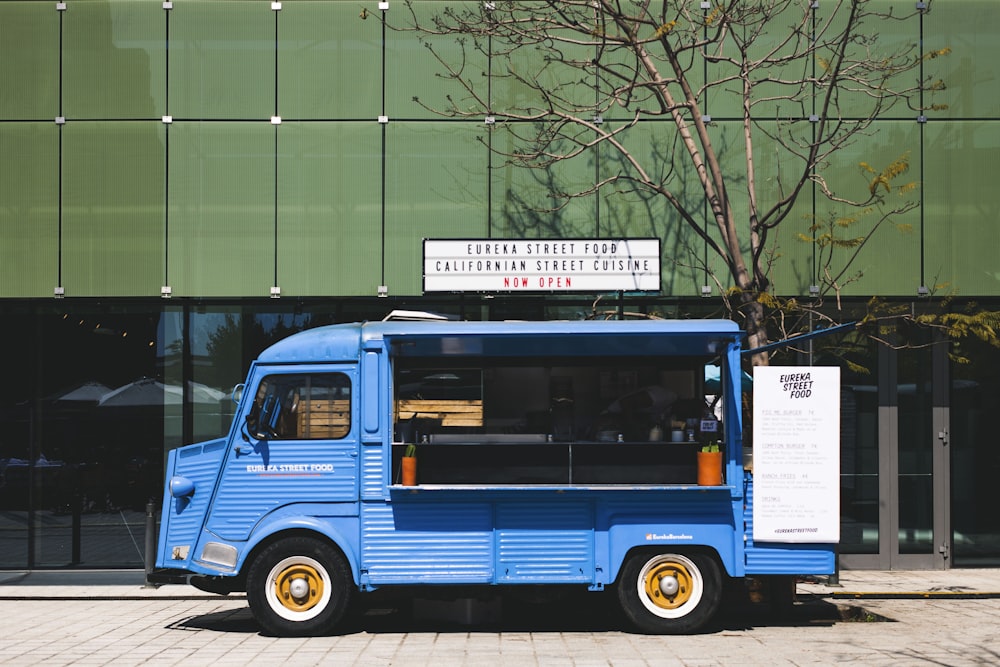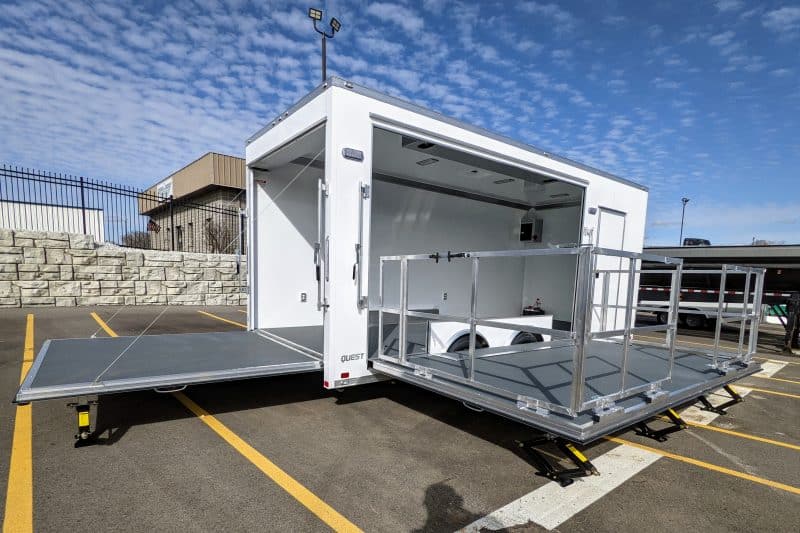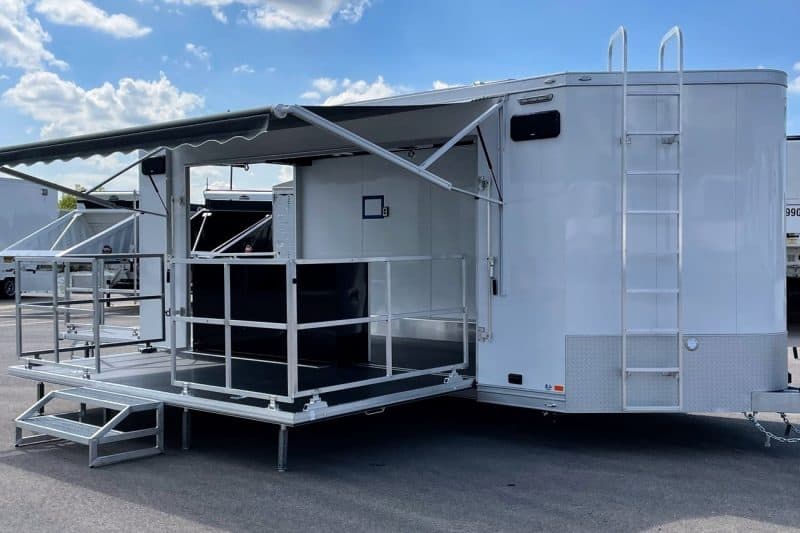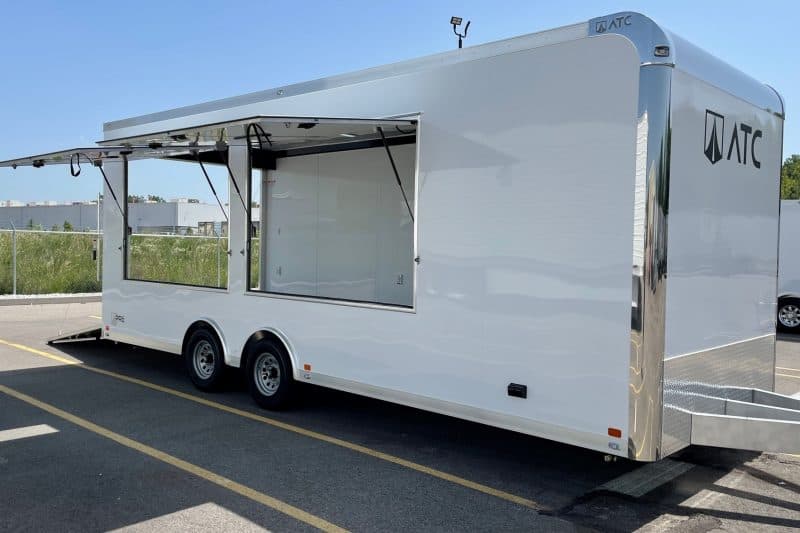Food Trailers for Sale in South Carolina
Food Trailers for Sale in South Carolina: Your Ultimate Guide

Food Trailers for Sale in South Carolina Image Source: Unsplash
Food Trailers for Sale in South Carolina . Are you looking to start your own food business in South Carolina ? Well, you’re in luck! Food trailers have become increasingly popular in recent years, offering entrepreneurs a flexible and affordable way to enter the food industry. In this comprehensive guide, we will explore the ins and outs of food trailers for sale in South Carolina, providing you with all the information you need to get started on your culinary journey.
Table of Contents
- Introduction
- Why Choose a Food Trailer?
- Factors to Consider When Buying a Food Trailer
- Size and Layout
- Equipment and Appliances
- Permits and Regulations
- Where to Find Food Trailers for Sale in South Carolina
- Online Marketplaces
- Local Dealerships and Manufacturers
- Tips for Inspecting a Used Food Trailer
- Structural Integrity
- Plumbing and Electrical Systems
- Kitchen Equipment
- Financing Options for Food Trailers
- Loans and Leasing
- Crowdfunding and Grants
- Customizing Your Food Trailer
- Exterior Design and Branding
- Interior Layout and Functionality
- Licensing and Permits for Operating a Food Trailer in South Carolina
- Health Department Permits
- Business Licenses
- Food Safety Training
- Marketing and Promoting Your Food Trailer
- Social Media and Online Presence
- Local Events and Festivals
- Collaborations and Partnerships
- Managing Operations and Logistics
- Menu Planning and Pricing
- Inventory Management
- Staffing and Training
- Maintaining and Servicing Your Food Trailer
- Regular Cleaning and Maintenance
- Equipment Repairs and Upgrades
- Insurance Coverage
- Conclusion
1. Introduction
South Carolina is known for its vibrant food scene, with a rich culinary heritage that includes dishes like shrimp and grits, barbecue, and Lowcountry boil. If you have a passion for food and want to share your creations with the world, owning a food trailer can be a rewarding and profitable venture. With the flexibility to move to different locations and cater to various events, food trailers offer a unique way to connect with customers and build a loyal following.
2. Why Choose a Food Trailer?
Food trailers provide several advantages over traditional brick-and-mortar restaurants. Here are some reasons why you might consider investing in a food trailer:
- Affordability: Food trailers are generally more affordable to start and operate compared to restaurants. The lower overhead costs allow you to focus on creating delicious food and building your brand.
- Flexibility: With a food trailer, you have the freedom to choose your location and target different customer demographics. You can attend festivals, farmers markets, and even private events, maximizing your exposure and sales potential.
- Mobility: Unlike a fixed-location restaurant, a food trailer allows you to adapt to changing market demands. If one location isn’t performing as well as expected, you can easily move to a new area to reach a larger customer base.
- Creativity: Food trailers provide a platform for culinary creativity. You can experiment with different menu items and flavors, constantly offering something new and exciting to your customers.
3. Factors to Consider When Buying a Food Trailer
Before purchasing a food trailer, there are several factors you need to take into account. These considerations will help ensure that you find the perfect trailer to fit your needs and maximize your chances of success.
Size and Layout
The size and layout of the food trailer are crucial aspects to consider. You need to determine the amount of space required for your kitchen equipment, storage, and workspace. Additionally, think about the number of customers you expect to serve at once and whether you need a separate serving window or counter.
Equipment and Appliances
Another important factor is the equipment and appliances included in the food trailer. Assess the condition and functionality of the cooking equipment, refrigeration systems, ventilation, and other essential components. Make a checklist of your specific needs and verify that the trailer meets those requirements.
Permits and Regulations
Before purchasing a food trailer, familiarize yourself with the permits and regulations related to operating a food business in South Carolina. Contact the local health department to understand the requirements for food safety, licensing, and inspections. Compliance with these regulations is essential to ensure the smooth operation of your business.
4. Where to Find Food Trailers for Sale in South Carolina
When it comes to finding food trailers for sale in South Carolina, you have several options. Here are two popular avenues to explore:
Online Marketplaces
Online marketplaces, such as Craigslist and eBay, offer a wide range of food trailers for sale. You can browse through listings, compare prices, and connect with sellers directly. It’s essential to exercise caution when purchasing from online platforms and thoroughly inspect the trailer before finalizing the deal.
Local Dealerships and Manufacturers
Another option is to visit local dealerships and manufacturers specializing in food trailers. These establishments often have a showroom where you can see the trailers in person and discuss your specific requirements with knowledgeable staff. Working with local dealerships also allows you to establish a relationship for future maintenance and support.
5. Tips for Inspecting a Used Food Trailer
If you decide to purchase a used food trailer, it’s crucial to conduct a thorough inspection to ensure its condition and functionality. Here are some tips to guide you during the inspection process:
Structural Integrity
Inspect the trailer’s exterior for any signs of damage or wear. Look for dents, rust, or leaks that could affect the trailer’s structural integrity. Pay attention to the trailer’s hitch, wheels, and suspension system to ensure they are in good working condition.
Plumbing and Electrical Systems
Check the plumbing and electrical systems for any leaks, faulty connections, or outdated components. Ensure that the water supply, sinks, and wastewater disposal meet the health department’s standards. Test the electrical outlets, lights, and other electrical equipment to verify they are functioning correctly.
Kitchen Equipment
Evaluate the condition and functionality of the kitchen equipment, such as stoves, ovens, fryers, and refrigeration units. Make sure they are clean, well-maintained, and in proper working order. If possible, ask the seller for maintenance records and any warranties that may still be valid.
6. Financing Options for Food Trailers
Once you’ve found the perfect food trailer, the next step is to explore financing options. Here are a few popular choices for financing a food trailer:
Loans and Leasing
Many banks and financial institutions offer loans specifically designed for small businesses, including those in the food industry. You can also consider leasing options, which allow you to pay a monthly fee for the use of the trailer. Compare interest rates, terms, and repayment options to find the best fit for your financial situation.
Crowdfunding and Grants
Another alternative is to explore crowdfunding platforms or apply for grants. Crowdfunding allows you to raise funds from a large number of individuals who believe in your business idea. Grants, on the other hand, are non-repayable funds provided by government agencies, non-profit organizations, or private foundations. Research available options and eligibility criteria to increase your chances of success.
7. Customizing Your Food Trailer
One of the advantages of owning a food trailer is the ability to customize it to reflect your brand and attract customers. Consider the following aspects when customizing your food trailer:
Exterior Design and Branding
Create an eye-catching exterior design that showcases your brand and captures the attention of potential customers. Incorporate your logo, vibrant colors, and engaging signage to make a memorable impression. Ensure that the design aligns with your target audience and the type of cuisine you offer.
Interior Layout and Functionality
Optimize the interior layout of your food trailer for efficiency and productivity. Arrange the equipment and workstations in a way that maximizes space and facilitates workflow. Consider ergonomic design principles and consult with experienced food trailer owners for insights on creating an efficient layout.
8. Licensing and Permits for Operating a Food Trailer in South Carolina
Before you can start operating your food trailer in South Carolina, you must obtain the necessary licenses and permits. Here are a few key requirements:
Health Department Permits
Contact your local health department to obtain the necessary permits for food handling and preparation. You will likely need to complete a food safety training course, pass inspections, and adhere to specific regulations to ensure the safety of your customers.
Business Licenses
Register your food trailer as a business entity with the South Carolina Secretary of State’s office. Depending on the nature of your business, you may need additional licenses, such as a mobile food vendor license or a catering license. Research the specific requirements for your area to ensure compliance.
Food Safety Training
Completing a food safety training course is essential to ensure that you handle and prepare food in a safe and hygienic manner. Look for accredited courses that cover topics such as proper food storage, handling, and temperature control. Certifications from recognized organizations can provide credibility to your business.
9. Marketing and Promoting Your Food Trailer
To attract customers and build a loyal following, effective marketing and promotion are crucial. Here are some strategies to consider:
Social Media and Online Presence
Create a strong online presence by leveraging social media platforms such as Facebook, Instagram, and Twitter. Share enticing photos of your menu items, engage with your audience, and promote upcoming events or specials. Encourage customers to leave reviews and share their experiences to generate buzz.
Local Events and Festivals
Participating in local events and festivals can expose your food trailer to a large number of potential customers. Research upcoming events in your area and apply to become a vendor. Ensure that your menu offerings align with the event theme and target audience to maximize your chances of success.
Collaborations and Partnerships
Collaborate with other local businesses or influencers to expand your reach and tap into new customer segments. Partnering with complementary businesses, such as breweries or wineries, can create mutually beneficial opportunities for cross-promotion.
10. Managing Operations and Logistics
Running a food trailer involves more than just cooking delicious food. Here are a few aspects to consider for smooth operations:
Menu Planning and Pricing
Develop a diverse menu that appeals to your target audience while showcasing your culinary creativity. Consider seasonal ingredients and customer preferences when planning your offerings. Additionally, establish competitive pricing that reflects the quality and uniqueness of your menu items.
Inventory Management
Efficient inventory management is essential to avoid waste and ensure that you have the necessary ingredients and supplies on hand. Implement a system to track inventory levels, monitor expiration dates, and reorder items in a timely manner. This will help you optimize costs and minimize downtime.
Staffing and Training
If your food trailer requires additional staff, carefully consider your staffing needs and hire individuals who align with your values and work ethic. Provide proper training to ensure that your team understands food safety protocols, customer service standards, and your menu offerings.
11. Maintaining and Servicing Your Food Trailer
Regular maintenance and servicing are crucial to keep your food trailer in optimal condition. Here are some maintenance tasks to prioritize:
Regular Cleaning and Maintenance
Maintain a regular cleaning schedule to keep your food trailer clean and sanitary. Clean all surfaces, equipment, and utensils after each use, and perform deep cleaning periodically. Regularly inspect and maintain the trailer’s plumbing, electrical systems, and ventilation to prevent issues.
Equipment Repairs and Upgrades
Address any equipment repairs promptly to minimize downtime and ensure that your kitchen operates smoothly. Consider upgrading your equipment as needed to improve efficiency, energy savings, or to expand your menu offerings. Stay informed about the latest trends and technological advancements in the food industry.
Insurance Coverage
Protect your investment and business by obtaining the appropriate insurance coverage. General liability insurance, auto insurance, and property insurance are essential to mitigate risks associated with operating a food trailer. Consult with an insurance professional to understand your specific needs and find the right coverage.
12. Conclusion
Starting a food business with a food trailer in South Carolina can be an exciting and fulfilling endeavor. By considering the factors discussed in this guide, conducting thorough research, and taking strategic steps, you can increase your chances of success. Remember to stay adaptable, continuously innovate, and provide exceptional food and service to your customers. With determination and passion, your food trailer venture can thrive in the vibrant culinary landscape of South Carolina.



















